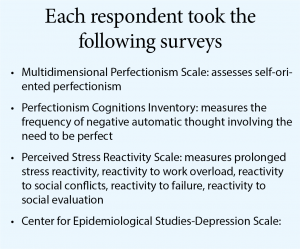Editor’s note: This story packages with another headlined, “Mindfulness, controlled breathing reduce anxiety symptoms”
When Monica Packer decided to go back to counseling for her struggles with perfectionism, the therapist told her the results of the intake survey indicated severe depression. Packer, in an incredulous and almost peppy tone, said, “I’m depressed?”
A recent study published in the Journal of Psychopathology and Behavioral Assessment confirms past suggestions that perfectionists are easily stressed out.
Canadian researchers 191 university students who were attending a university where a previous study indicated a significant number of psychological problems and high levels of stress among students. In that study, of the 634 students, 54.4 percent expressed they had felt a greater than average amount of stress in the past year.
Each of the 191 respondents took four surveys to assess their perfectionistic tendencies, reactions to stress, and depressive symptoms. The study was published in June 2016.

Jennifer Finlayson-Fife, an LDS psychotherapist specializing in relationship and sexuality counseling, said she sees perfectionism as a condition, “more as a way of engaging with the world that is limited and creates misery.”
“I think people bring often to themselves and to their lives a demand to kind of live above the human condition that affects their ability to have joy and to be at peace with themselves,” Finlayson-Fife said.
After administering the surveys and analyzing the data, researchers found perfectionism — and the tendency of people with perfectionistic thoughts to focus on thoughts about the need to be perfect —were associated with stress.
Researchers concluded people with perfectionistic tendencies have increased levels of stress related to failure, and perfectionists typically overreact to failure.

Self-oriented perfectionism
Self-oriented perfectionism has been said to have positive effects on people. It is considered the “adaptive” version of perfectionism. Self-oriented perfectionism, when practiced to the extreme, can lead people to “feel threatened following a personal failure to the point that effort is withdrawn,” according to the study.
Patrick A. Steffen, director of clinical training for the clinical psychology program at BYU, said adaptive perfectionism works when people set realistic and simple goals to work on each day, rather than saying, “I want to become the best at something” — which he defines as maladaptive perfectionism.
Finlayson-Fife said she sees much perfectionism and rigidity in her clients. One of the most extreme cases was correlated with anxiety. She had a client who was obsessive about controlling his sexual thoughts, so he wouldn’t go to the movies or go on dates. He was trying to meet his goals, but he also ended up living in fear of not meeting his goals.
“He kind of couldn’t live his life because he was so terrified of breaking that rule,” Finlayson-Fife said. “But from another frame, he has completely disabled his own ability to just live his life and to function because he’s so intolerant of his own humanity.”
Finlayson-Fife said perfectionism is self-contempt, but living up to high ideals, what Steffen might call adaptive perfectionism, is self-compassion.
Maladaptive perfectionism affects the way members of The Church of Jesus Christ of Latter-day Saints perceive their relationship with God and leads them to think they lose value in God’s eyes, according to Finlayson-Fife.
Socially Prescribed Perfectionism
Socially prescribed perfectionism leads people to feel stressed, and according to the perfectionism social disconnection model, some people with high levels of this perfectionism become socially isolated “because of their sensitivity to negative feedback from other people.”
This study also found socially prescribed perfectionism is associated with chronic stress, which often leads to depressive symptoms.
BYU alumna Packer is a self-identified perfectionist. Packer said she was the perfect student while she was at BYU. She had perfect grades, applied for grants, visited professors outside of class, took honors classes, worked as a research assistant and was a freshman mentor. But she said she was also an over-achiever perfectionist.
Packer realized she needed to go to counseling when she returned from a study abroad in London.
“(I was) feeling like death would be a lot easier than doing what I was doing,” Packer said. “I legitimately just felt so lost on how to get better.”
Packer said her perfectionism affected the way she viewed everything.
“Either I felt way too much or way too little,” Packer said. “There was either constant panic and a debilitating fear, anxiety, or there was nothing.”

Packer refers to herself as a recovering perfectionist.
“(A recovering perfectionist is) someone who is daring to try, daring to grow and fail and maybe not hit my target or goal, maybe not be a success,” Packer said. “(A recovering perfectionist is) someone who is willing to look at each day and not beat myself down for what I didn’t get done and instead be like, ‘Good job, this is what you did.’ And be happy with it.”
Packer said recovering is about facing her fears and falling on her face, by growing slowly. She has learned about her need to grow and have goals — and that being a recovering perfectionist is about not giving up on life, because the purpose of her life is not for others to admire her.
“That’s very much part of the recovering part of it is — I’m still not great at this,” Packer said. “I’m still awfully hard on myself.”
Packer now has a podcast on progression at her website About Progress.
The researchers suggest therapy for those who have socially prescribed perfectionism, in order to address depressive symptoms and focus on reducing automatic thoughts about the need to be perfect.
While their study shows a correlation between perfectionism and stress, the researchers said perfectionism does not cause someone’s heightened reaction to stress. The study also relied on self-reporting and only tested university students who are already in a state of high stress. Researchers also did not control for neuroticism, which is a trait usually associated with contributing to stress.




